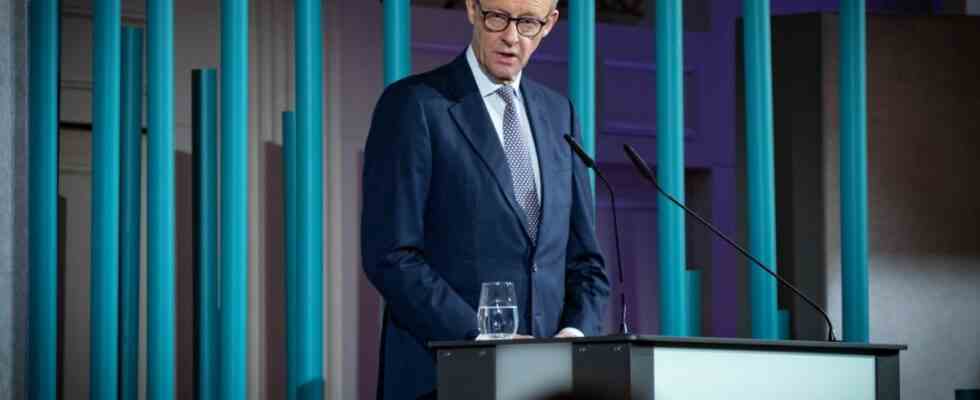During the week it was particularly chilly in the German Bundestag. The perceived temperature is said to have been well below the prescribed 19 degrees Celsius. It was heard from members of parliament, who therefore tried to get electric blankets and radiant heaters for their offices. All of this apparently had nothing to do with the alleged “ideologized energy supply” that the Union faction leader Friedrich Merz accused Federal Minister of Economics Robert Habeck (Greens) in the general debate on Wednesday. According to reports, there was simply a problem with the heating system in Parliament.
On Thursday morning at the Hotel Adlon in Berlin, Merz did not have to freeze. But it was also about the climatic conditions – in a larger context – when he appeared at the SZ Economic Summit. In his speech, the CDU chairman devoted himself to economic, energy and climate policy; in his view, all of this must be thought of more uniformly than before. Because, in addition to saving the world, there is another goal that he wants to devote himself to with the utmost urgency: “The Federal Republic of Germany must remain a country of manufacturing industry,” said Merz
In his presentation, he explored the question of how the contradiction that is often raised between the need for climate protection and the needs of Germany as an industrial location can be resolved. And Merz wouldn’t be Merz if he hadn’t brought a suggested answer to the Adlon. “I am convinced that we will not solve the climate problem with pure avoidance strategies,” he said.
With reference to the failed world climate conference in Egypt, Merz emphasized the importance of innovations and technologies. These are essential to counteract climate change. Germany must therefore expand its research into products that process emitted CO₂. Specifically, Merz called the so-called “sequestration”, i.e. technologies that bind carbon and thus remove it from the atmosphere. The conviction that the global climate goals can no longer be met with the sole attempt to limit CO₂ emissions had matured at Merz even before the meager result from Sharm el-Sheikh.
Of course, this view also has a partisan note, which Merz even concedes. After all, his proposal fits in very well with the credo of the CDU and CSU that there should be “no bans on thinking” when it comes to energy supply in Germany. When Merz came to the point that the search for climate-friendly energy sources had to be looked at 360 degrees, it was only a matter of time before he demanded that the further use of nuclear power be “discussed without prejudice” – also beyond the recently decided continued operation of the existing piles until April. From the point of view of the Union, nuclear power is not primarily a highly dangerous, but rather a climate-friendly technology. And everyone who sees it differently has an ideological perspective from Merz’s point of view.
Friedrich Merz has not escaped the fact that both Economics Minister Habeck and Finance Minister Christian Lindner (FDP) had spoken about the controversial fracking technique at the SZ Economic Summit the day before and that there are apparently different views between the Green and Liberal Ministers. Merz let it be known, slightly patronizing, that he did not want to go into this any further. Nevertheless, he left no doubt that he was on the side of the FDP leaders, who on Wednesday openly supported the promotion of domestic shale gas using fracking. Where there is a wedge between Habeck and Lindner, someone like Merz does not miss the opportunity to drive him in at least a tiny bit further.
Merz explicitly did not want to escalate his sharp attacks on Chancellor Olaf Scholz (SPD), whom he accused of “gross breach of word” to Parliament on Wednesday in the Bundestag. He even took the opportunity to promote more “fairness” in dealing with the Scholz government. Since the start of the war in the Ukraine on February 24, she has finally been confronted with completely different things than she had planned. “It would actually have been right to put the coalition agreement aside and rearrange the priorities,” says Merz about Scholz.
The relationship between the chancellor and the leader of the opposition, which was extremely tense at times, is said to have improved somewhat in the meantime. Friedrich Merz has good comparative values. At the beginning of the millennium, when he was leading the opposition under Gerhard Schröder’s government, the attacks of September 11 happened. And even then, in view of the dramatic world situation, there was a need for increased cooperation between the government and the opposition. “It was a little easier with Schröder back then due to personal reasons, but it’s now also working well with Scholz,” says Merz now. On Wednesday in the Bundestag, which was undercooled due to the heating, the two even shook hands.

